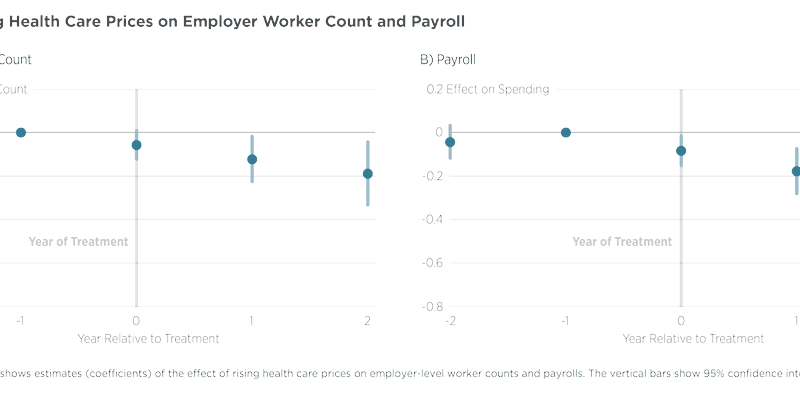
Zarek Brot
@zarekcb
Followers
844
Following
1K
Media
44
Statuses
517
Assistant professor at @UChicago @HarrisPolicy, fellow at @NBERpubs, @HMRLab @Harvard, @ChicagoFed. Health care "expert"
Chicago, IL
Joined August 2013
A big new paper with @zackcooperYale @stuartcraig @LevKlarnet, Ithai Lurie, and Corbin Miller: "Who Pays for Rising Health Care Prices? Evidence from Hospital Mergers" https://t.co/iSZ8A7BRcD With excellent recent WSJ coverage by @_melaevans:
wsj.com
Companies lay off workers to make up for health-insurance costs after hospitals raise prices, research finds.
2
12
26
Congratulations to Manasi Deshpande, @talgross, and @yalunsu who were recognized for the AEJ Best Paper Award for Applied Economics at #ASSA2025 for the paper “Disability and Distress: The Effect of Disability Programs on Financial Outcomes.” https://t.co/pw4O3ERLT4
3
18
119
Apropos of the ongoing conversation about health care administrative costs, resharing my testimony to Senate Budget on the administrative costs generated by provider-payer interactions and how policymakers could reduce them. Four main points:
1
9
27
My new paper - Is There Too Little Antitrust Enforcement in the US Hospital Sector? - with @zarekcb @stuartcraig & @LevKlarnet was just published in AER: Impact (@AEAjournals). A Thread
Forthcoming in AER: Insights: "Is There Too Little Antitrust Enforcement in the U.S. Hospital Sector?" by Zarek Brot-Goldberg, Zack Cooper, Stuart Craig, and Lev Klarnet.
4
54
150
This infographic tells the story of why this merger is going to raise hospital prices, lower local wages, and lead to job losses.
1
1
4
Based on my work with @zarekcb @stuartcraig and @LevKlarnet, this deal would hurt the local economy...$40 million in lost local wages, 500 or so jobs lost overall in Terre Haute. Our estimates imply approximately $50 million in economic losses.
nber.org
1
1
4
My estimate, based on work with @zarekcb @stuartcraig and @LevKlarnet in AER Insights: the deal would likely lead to local price increases of between 10% an 30%. https://t.co/gsJP92Ihqk
aeaweb.org
(December 2024) - From 2002 to 2020, there were over 1,000 mergers of US hospitals. During this period, the FTC took enforcement actions against 13 transactions. However, using the FTC's standard...
1
1
6
🚨New op-ed in the @indystar w/@GloriaSachdev (@EmplyrsForumIN) on decision @StateHealthIN faces re: giving a COPA to the Terre Haute Regional Hospital + Union Health merger. My take: the merger would be a gut punch to the Terre Haute economy. A 🧵 https://t.co/vGTE4jGr0v
1
4
8
Amazing reporting on what can happen when a hospital has monopoly power: “What we’re starting to see is that many of our local healthcare systems are boa constrictors just tightening around and squeezing the life of these local economies.” @zackcooperYale
theguardian.com
In the nation’s most affordable metro area, getting hurt or sick is expensive
8
41
61
Research update: we have a new version of our pharma M&A paper! AND, we posted the data we collected on m&a deals. Links below, main takeaways in thread. Paper summary: https://t.co/EKZykdsXHU Full draft: https://t.co/UjkOyIP1Dk Data:
lucamaini.com
1
17
59
Come work with me, @zarekcb, and @GottliebEcon on health economics research at UChicago as a @BeckerFriedman Research Professional! Deadline is rolling, but we plan to start reviewing applications later this month.
1
32
93
In fact, having internal faculty frequently evaluate each other is probably going to lead to a collusive equilibrium likely to reinforce all the issues stated here, not dissipate them…
0
0
0
Wouldn’t this generate high admin costs? Merit eval is super costly and involves current faculty time + outside letters, much of it unpaid. High frequency eval would require much lower effort and/or delegating to admins. (Putting admins in charge of merit seems un-ideal.)
This week I found myself advocating for abolishing tenure at universities. Since giving up tenure myself (and seeing how the private sector operates) I’ve become confident that experimenting with (higher paid) merit-based contracts would be a smart move for universities that want
1
0
2
Rising health care prices are passed onto employers as higher insurance premiums. The result? ⬇️ employment ⬇️ wages ⬇️ tax revenue ⬆️ overdoses https://t.co/gDCLXFYGit
@HarrisPolicy's @zarekcb, @zackcooperYale, @stuartcraig, @LevKlarnet, Ithai Lurie, & Corbin Miller.
bfi.uchicago.edu
Since 2000, prices in the United States health care sector have increased more than prices in any other part of the economy. While in most markets consumers pay for price hikes directly, in the...
0
10
13
"Hospital mergers that lead to price increases cause middle-income workers outside the health care sector to lose jobs." Read @zarekcb @zackcooperYale @stuartcraig @LevKlarnet on the link between employer-sponsored health care + U.S. labor market outcomes. https://t.co/QIJllaPx4j
equitablegrowth.org
Rising health care prices in the United States result in higher federal spending, lower federal tax revenue, and exacerbate economic inequality.
0
5
8
Oops forgot to include the link:
statnews.com
Three health economists tried to quantify exactly how much hospital ransomware attacks put patients at risk. Here’s what they found.
0
0
1
Claire McGlave, @HNeprash @saynikpay paper on ransomware attacks seems quite important for thinking about the consequences of Crowdstrike. Disrupting hospital IT kills vulnerable patients.
1
0
6
With most healthcare paid by 3rd parties, the costs of the system aren't salient. But it acts as an invisible tax on workers, companies, and govt. Research showing the effects of each hospital price increase is why we @Arnold_Ventures are so focused on bending the cost curve.
3
10
77
Cool paper, with a cool application of recentered formula IV to boot
The “hospital mergers” section is now like 2/3 of the entire Hospital Industry chapter of my health Econ course. I’m running out of space for more but this paper is so cool and depressing. https://t.co/UbM7ojzani
1
6
43




















